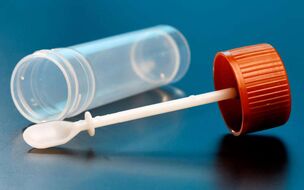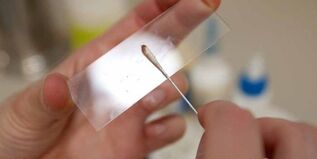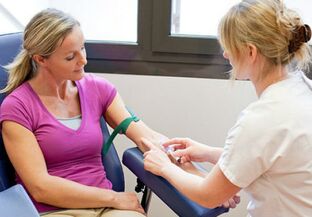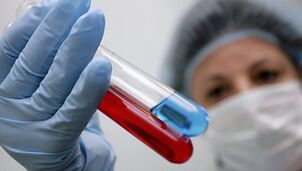What tests are needed to identify worms?
In order to detect the disease in a timely manner, regular tests on worms should be performed. The most well-known of these is fecal analysis, which is done before getting a job or going to a sanatorium, but it is not the only and not the most reliable way to identify parasites. The combination of tests gives the most accurate answer.
What tests are there on worms
Thelist of tests that must be done to detect parasites is quite long.
The main thing:
- Stool analysis, also known as worm eggs, is the most common method. Advantages - massive use, need for complex equipment. Minus - inaccuracy;
- ELISA, or blood test for worms. Pros - High accuracy. Disadvantages - reveals only certain stages of parasite development, other times the outcome will be questionable;
- Analysis of other biological agents (urine, sputum, duodenal contents, epidermis). Pros - They allow you to identify parasites in localizations that are inaccessible to other analyzes. Disadvantages - Associated with significant inconvenience to the patient.
Usually, a patient is prescribed a combination of several tests to identify the parasite. The criteria for recovery are a negative ELISA result and several negative results from a biological study where worms have been identified.
Stool analysis for worm eggs
Most worms live in the intestines, so the most common test for worms is stool testing. It is prescribed for routine medical examinations in adults and children before being sent to a hospital sanatorium or children’s camp as part of a health book. Also, this analysis is taken by people who have been in contact with infected patients who have eaten untested foods who have reported symptoms characteristic of worms.

No special preparation required for analysis, you can collect feces at any time of the day, but most indicate morning stools. You should wash your perineum immediately after giving birth to prevent urinary impurities and discharge from the genitals.
Stools are collected in a special container for worm analysis. It is sealed and a special spoon is attached to collect the material. To collect the most informative piece of material, you need to take a sample from the middle of the stool section. Filling the container takes about a third. You have to deliver it to the lab the same day.
In the laboratory, a specialist examines feces under a microscope and identifies the eggs of worms in it. Most have a characteristic shape that allows you to accurately determine the type of worm. Based on the results of the analysis, a conclusion is issued about the absence of eggs or their presence and type, after which treatment is prescribed.
This is the most common but less accurate worm test. The reason is that there may not be eggs in the part that hit the container, even though there are worms. Therefore, if the patient complains of characteristic symptoms or comes in contact with the source of infection, it is necessary to pass 5-6 tests at intervals of 2-3 days. In this case, the probability of detecting parasites increases significantly. Other diagnostic procedures are prescribed along with the stool examination.
skin abrasion

This analysis usually complements a stool analysis. The most accurate result is achieved by diagnosing pinworms that lay eggs on the surface of the skin near the anus. Indications for such analysis include routine examination of children and adults, registration of a child in kindergarten, school, camp or sanatorium, hospitalization of children and adults, suspected acute worm infection (anal itching, indigestion, contact with patients). The name of the worm (baby coriander worm).
No need to prepare for worm analysis, no need to wash the perineum - so it is possible to wash the parasite eggs, you should refrain from bathing or showering the night before. The analysis is done in the morning. A special film is used to collect material from the skin of the interglottic crease. The study is also conducted under a microscope. It does not detect helminths other than pinworms.
Urine analysis
This test is the least commonly prescribed because the parasites almost never live in the urine. Situations are possible when pinworms are found in the urine analysis, but this indicates a violation of the rules of the analysis - the parasites and their eggs enter the container from the skin of the perineum. Most often, this situation occurs in girls, less often in boys.
But there are still instructions for testing. The kidneys and urinary tract are home to some of the tropical parasites that humans “reward” by traveling to Asian and African resorts. With the increase in the availability of exotic resorts, the spread of parasites that are not typical for our country is also increasing. For this reason, after traveling to resorts it is advisable to do a urine and blood test on worms. Types of worms found in urine:
- Trichomonas;
- Distomum haatobium;
- Filaria sanguinis hominis;
- is an echinococcus.
There may also be eggs of liver parasites in the urine - echinococci and smoothies.
Sputum analysis
There are a number of parasites that spend most of their lives or in the lungs. Symptoms of their appearance are not typical - a catarrhal phenomenon develops in the bronchi (inflammation, cough, wheezing). Hemoptysis, pneumonia of unknown origin, and other pulmonary events may be noted.
Parasites detected by sputum worm test:
- Ascaris - they need oxygen at the larval stage;
- Echinococci and alveococci are tissue parasites that live in parenchymal organs, including the lungs;
- Dwarf fluke - lives mainly in the lungs;
- Strongyloidiasis, arachnorrhoea - parasitoses characterized by localization of the intestine, location in the lungs is atypical.
No special preparation is required to collect sputum, but it is advisable to brush your teeth and take the material in the morning. It is helpful to drink plenty of fluids beforehand - this improves the expectation of sputum. The collection container should be clean, but not necessarily sterile - bacteria do not play a role in the diagnosis. In this case, both the parasites themselves and their eggs are detected. If the patient is unable to cough up the phlegm, it is removed from the trachea using vacuum suction.
It is possible to use medications that improve sputum discharge, stimulate its formation, to get more accurate results of worm analysis. With a blood test on worms, it gives very accurate results. In contrast to the fecal test, eggs are more common.
Blood test

ELISA, or blood test for worms - the most accurate method of determining them. Helminths cause a strong reaction on the part of the immune system - the content of eosinophilic leukocytes increases, the production of immunoglobulins increases and specific antibodies to parasites appear. They are discovered based on the construction of the ELISA method.
Antibodies to parasites are very specific - they can be unequivocally diagnosed, and in the blood they are only present in the presence of parasites and within 3 weeks of disappearance.
Blood from a vein is required for analysis. No special training is required. The result can be obtained within two days. Accuracy is close to 100%, the specificity of the antibody does not give a false result. The recovery criterion is a negative result one month after treatment.Analysis of the contents of the duodenum
bile ducts and pancreatic ducts open into the duodenum. These organs are often affected by echinococcosis and opisthorchiasis. The parasites lay eggs that pass through ducts into the intestines. The method of analyzing the contents of the duodenum of the duodenum allows you to identify these diseases much more accurately than the analysis of feces.
The material is taken with a duodenal tube on an empty stomach. If the patient has a pronounced gag reflex, pain relief is used. The procedure is quite unpleasant, so it is applied only in cases where the results of other examinations are doubtful.
When you need to test for worms
Worm tests should be performed in the following situations:
- The patient has symptoms of helminth infection;
- The patient had contact with sources of infection (sick persons, untested products, places with unfavorable sanitary environment);
- Confirmation is required that the patient is not a source of infection (employment, health records, out-of-town vacation, hospitalization).
How to test for worms

You need to see a doctor to be examined for worms. Most examinations do not require preparation and if there are nuances, the doctor will explain them when scheduling the examination. Instructions are needed to write a referral to your doctor.
In commercial clinics you can do the analysis, regardless of the indication. The price varies considerably. The time to get the results of feces and scratches is about one week, urine, sputum, blood test is about 2 days, depending on the load of the laboratory.
Which helminths can be detected by tests
Analysis of worms allows you to identify most types of parasites - intestinal and intestinal forms. The most accurate is a blood test for worms, which allows you to detect the parasite.

















































